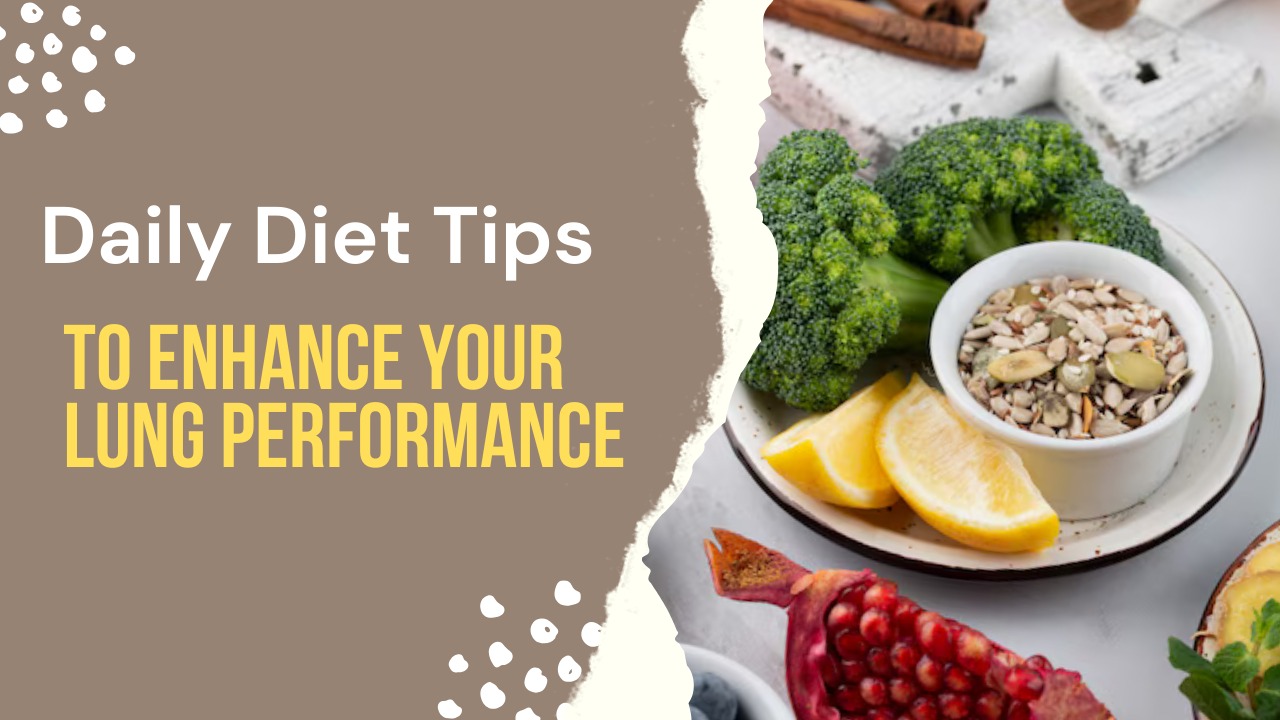Our lungs are constantly at work, supplying oxygen and removing carbon dioxide to keep every cell in the body functioning properly. Despite their importance, lung health is often overlooked—until we experience difficulty breathing or a respiratory illness. Supporting lung function before problems arise is essential for long-term wellness.
Just like the heart or brain, your lungs need the right fuel to stay strong. While avoiding smoking and pollution is important, your diet plays a vital role too. Nutrients like antioxidants, vitamins A, C, and E, and Omega-3 fatty acids help reduce inflammation, repair tissue, and strengthen lung capacity.
Incorporating health food for lungs into your daily meals can significantly boost your respiratory health. Leafy greens, berries, citrus fruits, garlic, turmeric, and fatty fish like salmon are excellent choices. These foods protect your lungs from damage, improve airflow, and support your immune system, helping you breathe easier and live more energetically.
In today’s environment, where air quality is worsening in many cities and respiratory conditions like asthma and COPD are on the rise, supporting your lungs through a healthy diet is more important than ever. The right foods can reduce inflammation, boost immune defense, detoxify lung tissues, and improve overall respiratory performance.
In this article, we’ll dive deep into the science of lung-friendly foods and give you 8 powerful tips to keep your lungs clean, clear, and healthy.
Understanding the Lungs and Nutrition
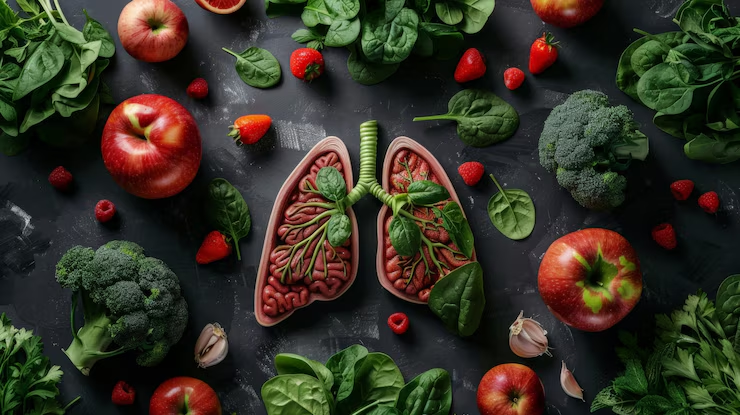
How Food Affects Lung Health: The foods you eat can significantly influence how well your lungs function. Adding the right health food for lungs to your daily meals supports cleaner, stronger, and more efficient breathing.
Here’s how:
🔹 Antioxidants Protect Lung Tissue
Antioxidants like vitamin C, vitamin E, and beta-carotene help neutralize free radicals caused by air pollution, smoke, and toxins.
These nutrients protect lung cells from oxidative damage and premature aging.
Health food for lungs rich in antioxidants includes berries, citrus fruits, carrots, and spinach.
🔹Anti-Inflammatory Compounds Ease Breathing
Chronic inflammation in the airways can cause difficulty breathing and increase the risk of diseases like asthma or COPD.
Omega-3 fatty acids, found in walnuts, flaxseeds, and fatty fish, help reduce inflammation naturally.
Turmeric and ginger also provide powerful anti-inflammatory benefits.
🔹Immune-Boosting Nutrients Prevent Infections
Vitamins A, C, D, and zinc help your body fight off respiratory infections such as bronchitis, flu, and pneumonia.
Garlic, mushrooms, and leafy greens are great health food for lungs that enhance immunity.
🔹 Hydrating Foods Thin Mucus
Staying hydrated helps thin the mucus in your lungs, making it easier to expel irritants.
Water-rich fruits and vegetables like cucumbers, watermelon, and oranges keep your lungs moist and clear.
🔹Detoxifying Foods Cleanse the Lungs
Cruciferous vegetables like broccoli, kale, and cauliflower support liver and lung detoxification.
These foods help flush out toxins, smoke residue, and pollutants from the respiratory system.
Top Health Food Tips for Lung Health
Let’s explore the top practical and powerful tips to nourish your lungs through your plate.
Load Up on Leafy Greens and Cruciferous Vegetables
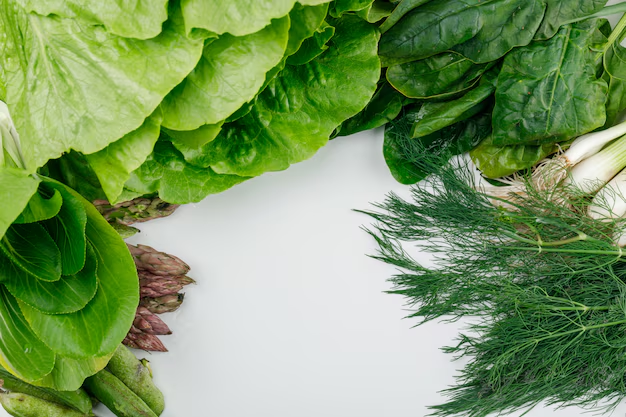
Leafy greens and cruciferous vegetables are some of the most powerful health food for lungs you can add to your diet. Packed with vitamins A, C, and K, along with essential minerals and antioxidants, these vegetables help protect lung tissues from oxidative stress caused by pollution and toxins. They also support immune function, which is vital for preventing respiratory infections.
Cruciferous vegetables like broccoli, cauliflower, kale, and Brussels sprouts contain compounds such as sulforaphane and glucosinolates. These natural chemicals help the body detoxify and reduce inflammation in the lungs. Regular consumption may lower the risk of chronic respiratory diseases, including asthma and COPD.
Adding leafy greens like spinach, arugula, and Swiss chard to your meals can help improve oxygen flow, thin mucus, and maintain lung elasticity. As a daily health food for lungs, these vegetables support long-term respiratory health and should be a staple in any lung-supportive nutrition plan.
Why they’re great: Vegetables like spinach, kale, arugula, broccoli, cauliflower, and cabbage are rich in antioxidants like vitamin C, flavonoids, and carotenoids. Cruciferous veggies contain sulforaphane, a compound that fights inflammation and protects lung tissues.
Benefits:
Detoxify lungs
Reduce risk of lung cancer
Fight oxidative stress from air pollution
How to eat: Add kale to your morning smoothie, toss spinach in your omelet, or enjoy steamed broccoli with dinner.
Include Omega-3 Rich Foods for Anti-Inflammation
Omega-3 fatty acids are well-known for their powerful anti-inflammatory properties, making them an essential health food for lungs. Chronic inflammation in the lungs can lead to conditions like asthma, bronchitis, and COPD. Omega-3s help reduce this inflammation, improving breathing and supporting overall lung function.
Foods rich in omega-3s include fatty fish like salmon, mackerel, sardines, and trout. Plant-based options such as flaxseeds, chia seeds, and walnuts also provide these healthy fats. Including these in your diet several times a week can lower lung irritation and protect against environmental damage caused by air pollution or smoking.
In addition to reducing inflammation, omega-3s support immune health and may help prevent respiratory infections. As part of a balanced diet, these nutrients play a key role in maintaining strong, resilient lungs. For anyone looking to improve breathing and prevent chronic respiratory issues, omega-3 rich foods are a must-have health food for lungs.
Why they’re great: Omega-3 fatty acids found in fatty fish (salmon, sardines, mackerel), chia seeds, walnuts, and flaxseeds can reduce inflammation in airways and improve lung function.
Benefits:
Helps in asthma and chronic inflammation
Protects lungs from long-term damage
Supports immune cells in respiratory tract
How to eat: Enjoy grilled salmon twice a week, add ground flaxseed to oatmeal, or snack on a handful of walnuts.
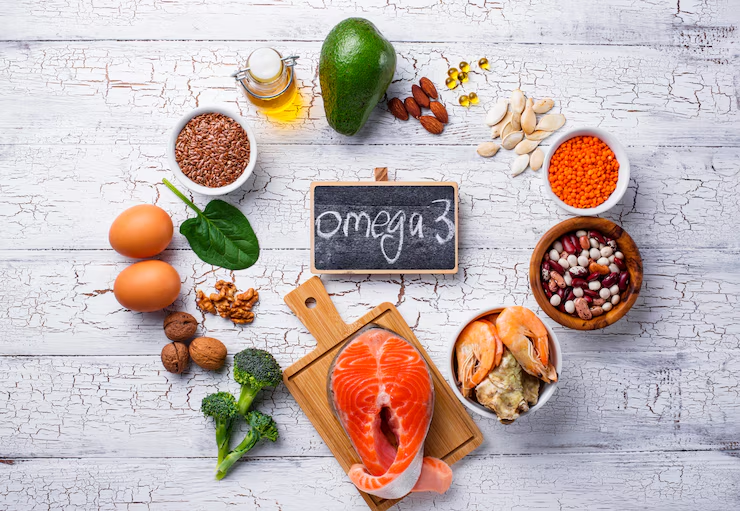
Eat Colorful Fruits Full of Antioxidants
Colorful fruits are a top-tier health food for lungs because they’re loaded with antioxidants that protect lung tissues from damage. Free radicals, caused by pollution, smoking, or infections, can harm lung cells and lead to inflammation. Antioxidants help neutralize these harmful molecules and support overall respiratory health.
Berries, oranges, grapes, pomegranates, and apples are rich in vitamin C, flavonoids, and polyphenols—compounds that reduce oxidative stress and boost immunity. These nutrients help reduce the severity of respiratory illnesses and promote quicker recovery from infections like colds or bronchitis.
Eating a variety of colorful fruits daily ensures your lungs get a wide range of protective nutrients. Aim to include fruits of different colors—like red berries, orange citrus, and dark grapes—for the greatest benefit. As a delicious and natural health food for lungs, fruits not only support breathing but also contribute to your body’s energy, hydration, and immune strength.
Why they’re great: Fruits like berries, oranges, papaya, pomegranates, and apples are antioxidant powerhouses. Apples, for example, contain quercetin, which has been linked to improved lung capacity.
Benefits:
Fight lung inflammation
Improve lung capacity
Reduce risk of COPD and asthma attacks
How to eat: Make a fruit salad, blend berries into a smoothie, or snack on a crisp apple daily.
Stay Hydrated with Water and Mucus-Clearing Foods

Staying hydrated is essential for lung health, as water helps keep the mucosal linings in the lungs thin and moist. This makes it easier to expel mucus, allergens, and toxins from the respiratory system. Adequate hydration is one of the simplest yet most effective ways to support clear, healthy breathing.
In addition to water, including mucus-clearing foods like pineapple, ginger, garlic, and onions can further enhance respiratory function. These natural health food for lungs contain compounds that help break down mucus, reduce inflammation, and improve airflow. For example, bromelain in pineapple acts as a natural mucolytic agent, helping clear congestion.
To support your lungs daily, aim for 8–10 glasses of water and include hydrating fruits and vegetables such as cucumber, watermelon, and citrus. These foods not only help flush out toxins but also deliver essential nutrients, making them ideal health food for lungs to keep your respiratory system clean and strong.
Why it’s great: Hydration is essential for thinning mucus in the lungs. Thick mucus can trap allergens, bacteria, and irritants, making breathing more difficult.
Top foods: Cucumber, celery, watermelon, citrus fruits, and of course, water.
Benefits:
Clears mucus
Supports detoxification
Prevents lung infections
How to eat: Start your day with a glass of warm lemon water. Snack on water-rich fruits throughout the day and drink at least 8-10 glasses of water.
Spice Up with Lung-Cleansing Herbs and Spices
Herbs and spices aren’t just for flavor—they’re powerful allies for lung health. Many contain natural compounds that help cleanse the respiratory tract, reduce inflammation, and fight infections. Adding them to your meals is a simple way to support your lungs every day using health food for lungs that are already in your kitchen.
Turmeric, for example, contains curcumin, a potent anti-inflammatory that may help soothe irritated airways. Ginger helps clear mucus, reduce congestion, and relax the muscles in the respiratory system. Garlic is another excellent choice—it offers antimicrobial and immune-boosting properties that protect the lungs from infections.
Incorporating these herbs and spices into your daily diet—whether in soups, teas, or stir-fries—can enhance breathing, support detoxification, and strengthen lung defenses. As a flavorful and functional health food for lungs, spices like turmeric, ginger, and garlic offer a natural, affordable way to protect your respiratory system and improve overall wellness.
Why they’re great: Herbs like turmeric, ginger, garlic, oregano, and thyme have natural anti-inflammatory and antimicrobial properties.
Benefits:
Reduce airway inflammation
Help fight respiratory infections
Loosen and expel mucus
How to eat: Add turmeric to curries or warm milk, brew fresh ginger tea, and use garlic liberally in cooking.
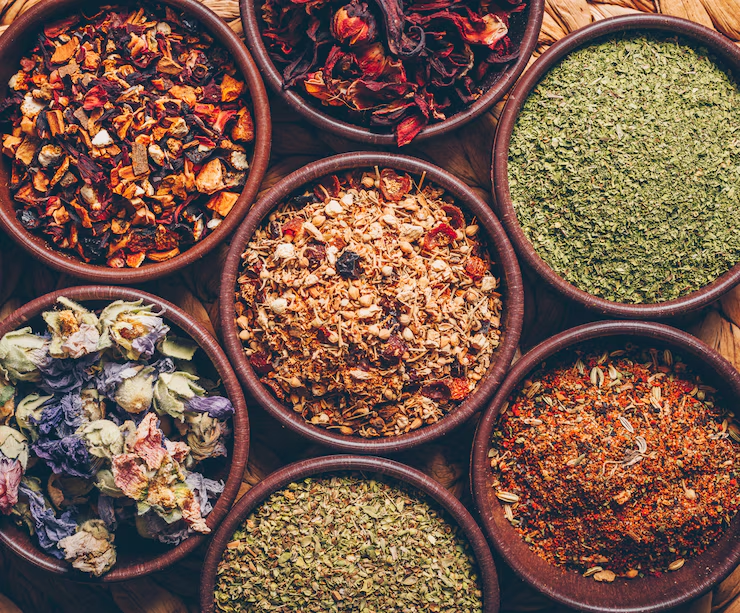
Add Foods High in Vitamin C and E
Vitamin C and E are two of the most important antioxidants for maintaining strong and healthy lungs. These nutrients protect lung tissues from damage caused by free radicals, pollution, and smoking. Including foods rich in these vitamins is a smart and natural way to support respiratory function using health food for lungs.
Vitamin C, found in citrus fruits, strawberries, bell peppers, and kiwi, boosts immunity and reduces inflammation in the airways. It helps prevent respiratory infections and promotes faster recovery if illness occurs. On the other hand, vitamin E—present in almonds, sunflower seeds, spinach, and avocados—protects the delicate lung cell membranes and supports overall lung elasticity.
By combining both vitamins through a balanced diet, you create a strong defense system against oxidative stress and chronic lung issues. These antioxidant-rich foods are not only delicious and versatile but also some of the best health food for lungs, promoting cleaner breathing and better lung capacity naturally.
Why they’re great: Vitamin C is a strong antioxidant that enhances lung function. Vitamin E, found in nuts and seeds, protects the delicate linings of the lungs.
Top foods:
Citrus fruits (oranges, lemons)
Red peppers
Almonds, sunflower seeds
Avocados
Benefits:
Strengthens lung tissue
Boosts immune defense
Slows lung aging process
How to eat: Enjoy a handful of almonds, use bell peppers in stir-fry, or drink freshly squeezed orange juice.
Consume Whole Grains and Fiber-Rich Foods
Whole grains and fiber-rich foods play a crucial role in supporting lung health. They help regulate blood sugar levels, reduce inflammation, and improve digestion—all of which indirectly benefit the respiratory system. Including fiber in your diet also helps manage body weight, which is important for maintaining healthy lung function, especially in people with asthma or COPD.
Foods like oats, brown rice, quinoa, barley, lentils, and beans are excellent sources of fiber and essential nutrients such as magnesium, selenium, and B vitamins. These nutrients support cellular repair and reduce the risk of lung-related illnesses. A high-fiber diet has also been associated with better lung capacity and reduced respiratory symptoms in adults.
Incorporating whole grains and fiber-rich options into your meals is an easy way to boost your intake of health food for lungs. Over time, these nutrient-dense foods can help strengthen your respiratory system and promote long-term lung vitality.
Why they’re great: Diets high in fiber are linked with better lung function. Fiber reduces inflammation and supports gut bacteria that influence immune health.
Top foods: Oats, quinoa, barley, beans, lentils, and brown rice.
Benefits:
Lowers risk of respiratory illness
Improves immune system response
Reduces risk of lung decline with age
How to eat: Start your morning with a bowl of oatmeal or add lentils to soups and stews.
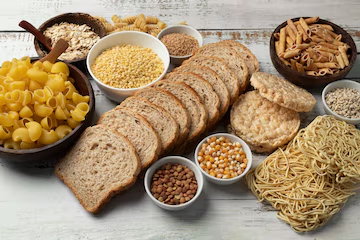
Avoid Lung-Harming Foods and Eat Clean
Protecting your lungs isn’t just about what you eat—but also what you avoid. Highly processed foods, sugary snacks, and excessive dairy can increase inflammation and mucus production, making it harder to breathe freely. These items may also weaken the immune system, increasing your vulnerability to respiratory infections.
Instead, focus on clean, whole foods that nourish the body and strengthen your lungs. Fresh vegetables, fruits, lean proteins, and healthy fats offer essential vitamins and minerals that support respiratory health. Choosing organic options when possible can also reduce your exposure to pesticides and chemicals that may harm lung tissues.
Making the shift toward clean eating not only boosts your energy but also enhances lung function over time. Prioritizing health food for lungs—such as leafy greens, garlic, berries, and nuts—helps reduce airway irritation, supports oxygen flow, and keeps your respiratory system functioning at its best. Clean eating is a powerful step toward better breathing.
Why it matters: Just as some foods protect your lungs, others can harm them. Processed meats, sugary drinks, fried foods, and excessive dairy may trigger inflammation or mucus buildup.
Avoid:
Processed meats (bacon, sausage)
Excess salt
Sugary beverages
Trans fats and refined carbs
Replace with:
Natural protein sources like beans and lentils
Lifestyle Tips to Complement a Lung-Healthy Diet
While eating the right health food for lungs is essential, combining nutrition with supportive daily habits can significantly enhance your lung strength and breathing efficiency. Here’s how:
🔹Practice Deep Breathing Every Day
Engage in deep breathing exercises like diaphragmatic or pursed-lip breathing to expand your lung capacity and improve oxygen intake.

Just 10 minutes a day can strengthen your respiratory muscles and promote relaxation.
🔹 Avoid Indoor Pollutants
Steer clear of synthetic air fresheners, chemical cleaning agents, and smoke indoors.
These can irritate lung tissues and trigger breathing issues. Opt for natural cleaners and good ventilation.
🔹Exercise Regularly
Cardiovascular activities like walking, swimming, and cycling boost lung capacity and oxygen use.
Exercise works best when combined with a diet rich in health food for lungs for faster recovery and endurance.
🔹 Quit Smoking and Avoid Secondhand Smoke
Smoking is the leading cause of lung damage and chronic respiratory diseases.
Quitting smoking and staying away from secondhand smoke dramatically reduces inflammation and improves breathing.
🔹Use Air Purifiers at Home
HEPA filters help remove airborne pollutants, allergens, and dust that can irritate your lungs.
This is especially important if you live in an urban or high-smog area.
🔹 Stay Active to Strengthen Lungs
Physical activity keeps your lungs working efficiently and improves circulation.
Pairing regular movement with health food for lungs enhances your overall respiratory and immune health.
Meal Plan for Lung Health (1-Day Sample)
Here is your lung-supportive meal plan presented in table form with the keyword health food for lungs included:
Daily Meal Plan Featuring Health Food for Lungs
| Meal | Menu |
|---|---|
| Breakfast | Oatmeal topped with blueberries, flaxseeds, and almonds Green tea with lemon – rich in antioxidants and great health food for lungs |
| Snack | Apple slices with a handful of walnuts – high in fiber and omega-3s, a powerful health food for lungs |
| Lunch | Quinoa salad with kale, chickpeas, bell peppers, and olive oil Cucumber-infused water – supports hydration and lung detox |
| Snack | Ginger and turmeric tea – anti-inflammatory herbs that support lung health Fresh papaya – rich in vitamin C, a top health food for lungs |
| Dinner | Grilled salmon (omega-3 rich) with steamed broccoli and brown rice Watermelon cubes – hydrating and antioxidant-rich health food for lungs |
Conclusion
Your lungs may work silently behind the scenes, but they are essential to every breath, heartbeat, and movement. Often overlooked in our daily routines, the lungs deserve proactive care—not just when problems arise. The best time to support your respiratory system is now, and one of the most powerful tools for doing so is your diet. Choosing the right health food for lungs can make a lasting impact on your overall well-being.
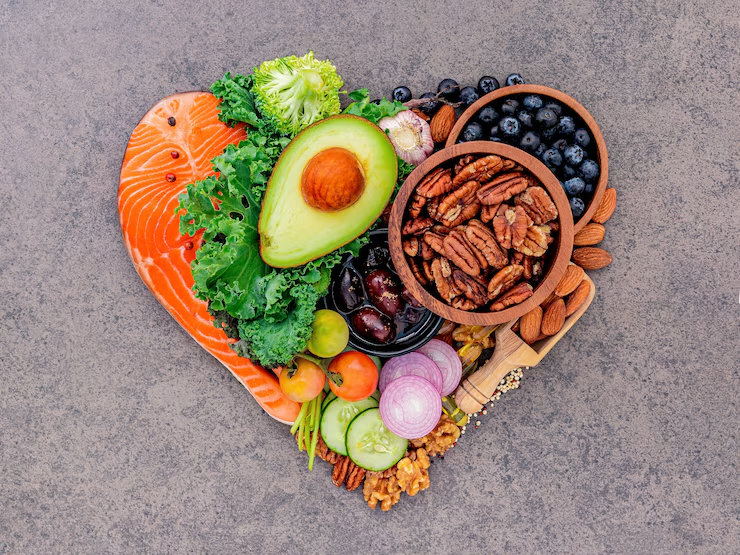
By incorporating specific foods—rich in vitamins, antioxidants, and anti-inflammatory compounds—you can help reduce the risk of chronic respiratory conditions such as asthma, bronchitis, or COPD. Leafy greens, berries, citrus fruits, garlic, fatty fish, and whole grains are all examples of health food for lungs that naturally protect and strengthen lung tissues.
With these 8 food-based tips and a commitment to healthy eating, you can take control of your breathing and feel the difference daily. Cook with intention, choose lung-supportive groceries, and breathe deeply—your lungs will thank you.
FAQs
Q1. What is the best health food for lungs?
The best health food for lungs includes foods rich in antioxidants, anti-inflammatory compounds, vitamins, and minerals. Leafy greens (like kale and spinach), cruciferous vegetables (like broccoli and cauliflower), berries, citrus fruits, garlic, turmeric, ginger, fatty fish, and whole grains all contribute to lung health. These foods help detoxify the lungs, reduce inflammation, and protect against oxidative stress caused by pollution, smoke, or illness.
Q2. How do antioxidant-rich foods benefit the lungs?
Antioxidant-rich health food for lungs, such as berries, bell peppers, and green tea, help neutralize free radicals in the lungs. Free radicals are unstable molecules created by pollution, cigarette smoke, or toxins, which can damage lung tissue and trigger inflammation. Antioxidants like vitamin C, E, and beta-carotene protect lung cells, promote healing, and may lower the risk of respiratory diseases.
Q3. Can food really help cleanse or detox the lungs?
Yes, incorporating detoxifying health food for lungs into your diet can assist your body’s natural cleansing processes. Foods like garlic, turmeric, ginger, and cruciferous vegetables support liver and lung detoxification. They help the body eliminate mucus, reduce inflammation, and flush out pollutants, especially in individuals exposed to smoke, dust, or urban pollution.
Q4. What foods should be avoided for better lung health?
Just as some foods help the lungs, others can harm them. Avoid or limit processed meats, excessive dairy, sugary snacks, fried foods, and refined grains. These can increase inflammation and mucus production. Instead, opt for clean, whole health food for lungs like fruits, vegetables, nuts, seeds, and legumes to support easier breathing and reduce respiratory strain.
Q5. How much of these lung-friendly foods should I eat daily?
To optimize lung health, aim to fill half your plate with fruits and vegetables at each meal—especially those high in vitamins C, A, E, and fiber. Include a variety of health food for lungs throughout the day: leafy greens in salads or smoothies, berries for snacks, fatty fish 2–3 times per week, and spices like ginger or turmeric in teas or meals. Consistency is key for long-term lung support.

